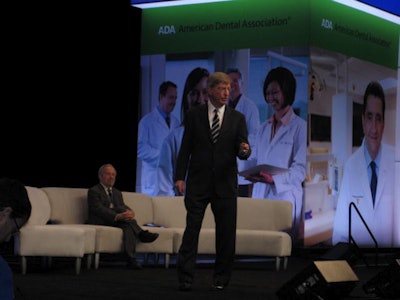
SAN FRANCISCO - Economist Robert Reich and conservative columnist George F. Will opened the 2012 ADA Annual Session this morning with a lively debate about the soaring cost of healthcare, the economy, politics, and free speech.
The event was attended by several hundred people in one of the Moscone Center's cavernous auditoriums, and their spirited exchange was often met with laughter and applause.
 The Distinguished Speaker Series for the opening session of the ADA Annual Session featured economist Robert Reich (left) and conservative columnist George F. Will.
The Distinguished Speaker Series for the opening session of the ADA Annual Session featured economist Robert Reich (left) and conservative columnist George F. Will.Reich, a professor of public policy at the University of California, Berkeley, and former secretary of labor under President Bill Clinton, provided several comic moments during the 30-minute exchange, starting with an allusion to his diminutive size.
"As you can see, the economy has worn me down," he said.
He then advocated "civil discourse" among U.S. politicians but observed that politics comes from the word "poly," meaning "many," and "tics," meaning "small, blood-sucking insects."
Will, a widely read conservative political columnist for the Washington Post who won a Pulitzer Prize for commentary, joked, "the American people are gripped by a fear of becoming Greece or, worse yet, California."
He attributed much of the country's economic problems to entitlements. "We are in danger of entering a death spiral of the welfare state," he said.
The wave of retiring baby boomers will exert enormous pressure on the economy, Will added. "The aging of the population is driving this utterly predictable crisis," he said.
Reich provided a funny comparison, saying the baby boomers are "like a pig moving through a python."
Will called the welfare state a "regressive transfer of wealth," noting there won't be enough working people to offset the demands of the coming wave of Social Security recipients. The U.S. will need 900,000 immigrants per year to replace retiring workers, he said.
"Over the next 10 to 20 years we need to change the trajectory of the welfare state," he said. "It's absolutely necessary but tremendously unpopular," Will said, noting that Americans are "ideologically conservative but operationally liberal."
When asked which of the presidential candidates is a better actor, Reich named Mitt Romney, saying he didn't recognize him in the first debate as he "bounded on stage" and adopted an aggressive style.
"I think acting is part of politics, and both President Obama and Romney are pretending to like people," Will countered.
Both discussed the enormous amount of money in politics but, predictably, from different stances.
Reich said he worries about money from vested interest groups who want subsidies and tax breaks, adding "no bank should be too big to fail." But Will said it's impossible to restrict money in politics without restricting free speech, adding that it violates First Amendment free speech rights.
Referring to the controversial U.S. Supreme Court's Citizens United decision that corporations are people, Reich said, "I will believe that a corporation is a person when the state of Texas starts executing corporations."

















